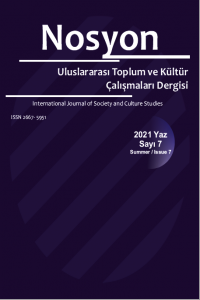Abstract
Makale 1920’lerde yazılmış Platonov’un romanlarının yaygın bir yorumunun eleştirisiyle başlamaktadır. Bu romanlar, Stalinist ütopyanın ve katastrofik sonuçlarının eleştirel bir tasvirini sunmaktadır. Makale, bahsi geçen romanların Stalinizmin bir eleştirisi olduğunu ifade eden yorumlara karşı çıkmakta ve bu romanları 1930’lara sirayet etmiş olan geç dönem Stalinizme karşı çıkan gnostik-materyalist ütopyanın bir eleştirisi olarak görmektedir. Makale, “biyokozmizm” olarak ifade edilen günümüzün tekno-gnosis ütopyasının görünümleriyle yüzleşmekte, burjuvazinin son güçlü karşı devrimi olan artı-değer olarak cinselliğe odaklanmaktadır. Gnostik-materyalist eleştirinin ortaya çıkışını ayrıca Platonov’un makalesi olan “Anti-Sexus”un içinde mastürbasyon cihazlarının ilanı olarak da görmekteyiz. Metin, bu cihazı, aletlerin (Lacan’ın les lathouses olarak tanımladığı), yalnızca insanı tamamlayıcı olmayan, daha çok insanı dilsel varlık olarak cinsiyetlendirilmesine olanak sağlayan “ölmeyen” organların çoğalması bağlamında tartışmaktadır.
Keywords
Budizm Haz Gnostisizm Materyalizm Platonov Cinsellik Stalinizm
References
- Balmès, François (2011). Structure, logique, aliénation. Toulouse: Érès.
- Besnier, Jean-Michel (2010). Demain les posthumains: Le futur atil encore besoin de nous? Paris: Fayard.
- Chiesa, Lorenzo (2007). Subjectivity and Otherness: A Philosophical Reading of Lacan. Cambridge, MA: MIT Press.
- Dupuy, JeanPierre (2004). “Le problème théologicoscientifique et la responsabilité de la science.” Le Débat 129: 175–92.
- Farmer, J. Doyne, and Belin, Aletta d’A. (1992). “Artificial Life: The Coming Evolution.” In Artificial Life, ed. C. G. Langton et al., 815–40. Reading, MA: AddisonWesley.
- Figes, Orlando (2001). Natasha’s Dance: A Cultural History of Russia. London: Allen Lane.
- Hady, Ahmed El (2012). “Neurotechnology, Social Control and Revolution.” Big Think. http://bigthink.com/hybrid-reality/neurotechnology-social-control-and-revolu-tion.
- Lacan, Jacques (1992). The Ethics of Psychoanalysis. London & New York: Routledge. Lacan, Jacques (2007). The Other Side of Psychoanalysis. London & New York: W. W. Norton.
- Platonov, Andrey (2009). The Foundation Pit. New York: NYRB.
- Platonov, Andrey (2013). “The AntiSexus.” Trans. Anne. O. Fisher. Cabinet 51: 48–53. Wells, H. G. (2014). “H. G. Wells: ‘It seems to me that I am more to the Left than you, Mr Stalin’”. New Statesman [27 October 1934].
- http://www.newstatesman.com/politics/2014/04/h-g-wells-it-seems-me-i-am-more-left-you-mr-stalin.
- Žižek, Slavoj (2012). “From Animal to ‘Stamina Training Unit’.” In An Essay on Negativity, Immanence, and Freedom, ed. Oxana Timofeeva, 6–11. Maastricht: Jan van Eyck.
Abstract
The article begins with a critique of the prevalent interpretation of Platonov’s novels from the 1920s. These novels supposedly present a critical depiction of the Stalinist utopia and its catastrophic consequences. The article argues against such an interpretation by demonstrating that the aforementioned novels do not present a critique of Stalinism but rather a critique of the gnostic-materialist utopia against which late Stalinism reacted in the early 1930s. The article critically confronts various aspects of this utopia of “biocosmism” as the forerunner of today’s technognosis, focusing primarily on its tendency to surpass sexuality as the last stronghold of the bourgeois counterrevolution. This aspect of the critique of the gnostic-materialist utopia is also at work in Platonov’s essay “The Anti-Sexus,” conceived as an advertisement for a masturbatory device. The text discusses this device in the context of the proliferation of gadgets (what Lacan called les lathouses), the “undead” organs which are not mere supplements of the human organism but rather provide the key to the sexuation of human beings as beings of language.
References
- Balmès, François (2011). Structure, logique, aliénation. Toulouse: Érès.
- Besnier, Jean-Michel (2010). Demain les posthumains: Le futur atil encore besoin de nous? Paris: Fayard.
- Chiesa, Lorenzo (2007). Subjectivity and Otherness: A Philosophical Reading of Lacan. Cambridge, MA: MIT Press.
- Dupuy, JeanPierre (2004). “Le problème théologicoscientifique et la responsabilité de la science.” Le Débat 129: 175–92.
- Farmer, J. Doyne, and Belin, Aletta d’A. (1992). “Artificial Life: The Coming Evolution.” In Artificial Life, ed. C. G. Langton et al., 815–40. Reading, MA: AddisonWesley.
- Figes, Orlando (2001). Natasha’s Dance: A Cultural History of Russia. London: Allen Lane.
- Hady, Ahmed El (2012). “Neurotechnology, Social Control and Revolution.” Big Think. http://bigthink.com/hybrid-reality/neurotechnology-social-control-and-revolu-tion.
- Lacan, Jacques (1992). The Ethics of Psychoanalysis. London & New York: Routledge. Lacan, Jacques (2007). The Other Side of Psychoanalysis. London & New York: W. W. Norton.
- Platonov, Andrey (2009). The Foundation Pit. New York: NYRB.
- Platonov, Andrey (2013). “The AntiSexus.” Trans. Anne. O. Fisher. Cabinet 51: 48–53. Wells, H. G. (2014). “H. G. Wells: ‘It seems to me that I am more to the Left than you, Mr Stalin’”. New Statesman [27 October 1934].
- http://www.newstatesman.com/politics/2014/04/h-g-wells-it-seems-me-i-am-more-left-you-mr-stalin.
- Žižek, Slavoj (2012). “From Animal to ‘Stamina Training Unit’.” In An Essay on Negativity, Immanence, and Freedom, ed. Oxana Timofeeva, 6–11. Maastricht: Jan van Eyck.
Details
| Primary Language | Turkish |
|---|---|
| Subjects | Philosophy, Creative Arts and Writing |
| Journal Section | Translation |
| Translators | |
| Publication Date | June 30, 2021 |
| Submission Date | February 23, 2021 |
| Published in Issue | Year 2021 Issue: 7 |

